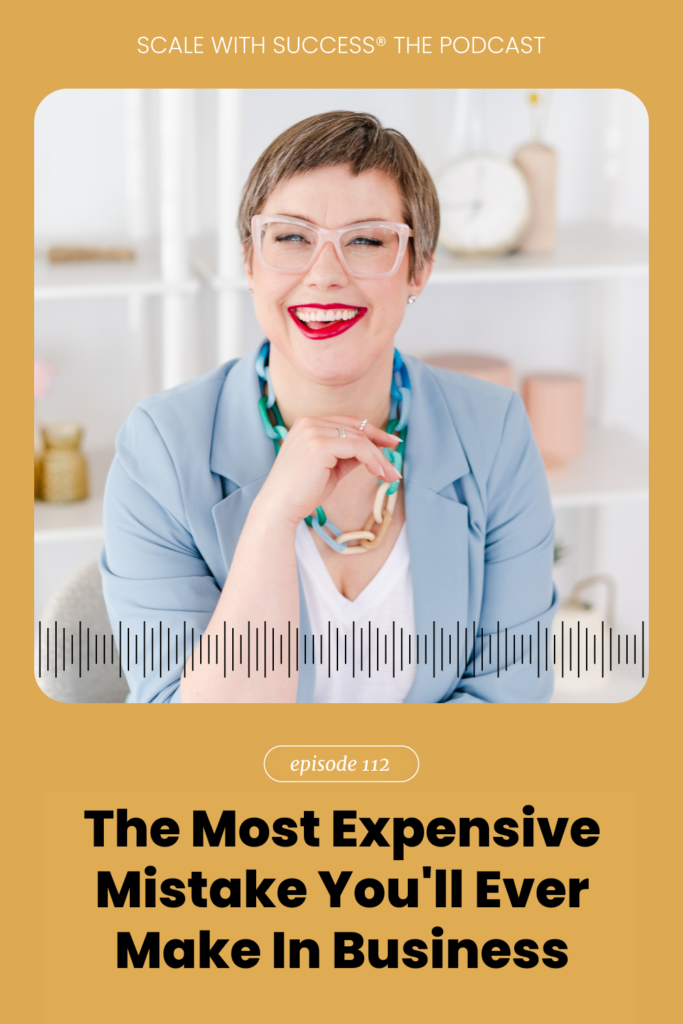Have you ever heard of The Drama Triangle? Maybe not, but I guarantee you’ve been IN The Drama Triangle many times in your life – and so have I.
Getting stuck in The Drama Triangle for too long can end up costing course creators like you millions of dollars and end up being the most expensive mistake you’ll ever make.
Today I’ll be sharing WHAT The Drama Triangle is and WHY it’s SUCH a dangerous place to be for ambitious entrepreneurs like yourself. Plus, I’ll show you how to quickly recognize when you are getting sucked into it, and exactly what you need to do to swiftly and safely escape it.
This is definitely an episode you’re going to want to listen to ALL the way to the end because there’s actually THREE DIFFERENT ways you can be stuck in The Drama Triangle and I’ll be talking about all of them.
So, let’s get started.
My name is Caitlin Bacher, CEO of Scale With Success®, and I’m on a mission to help course creators all over the world grow their business in a way that is profitable and scalable. I’m sharing revealing insights about what it really takes to scale an online course business to millions of dollars per year. Join me here to discover the tough decisions I’ve had to make, the biggest failures I’ve had to bounce back from, and the learnings that emerged every step of the way. I’m so grateful that I have the chance to tell you everything right here on Scale With Success®: The Podcast. Let’s get started.
I was first introduced to the concept of The Drama Triangle four years ago when I was really struggling with my own mental health. At the time, I was being very hard on myself and found it incredibly difficult to bounce back from what other people would consider to be minor setbacks.
I didn’t feel depressed, I felt frustrated. My brain would latch onto these thought loops that would either blame others, blame myself, and the story I kept telling myself was that success was possible for others – but, it wasn’t possible for me.
My mind was really playing tricks on me because from the outside looking in, I was successful. But, at the time I wasn’t seeing things clearly and my brain felt like a tangled web of lies I kept telling myself.
Then I discovered The Drama Triangle and suddenly everything clicked.
Now, what I’m about to share with you is not magic and it is not a replacement for medical care if you need that.
But, it really helped me and maybe it can help you!
So, let’s start by answering the question: What exactly IS The Drama Triangle?
The Drama Triangle is a framework created by Dr. Stephen Karpman back in the 1960’s to illustrate how people deal with conflict.
Karpman believed that when conflict occurred, it caused people to take on one of three different roles: Victim, Persecutor, and Rescuer.
And that choosing to play that role often prevented us from taking the actions we needed to take in order to move forward.
And as business owners if we’re not moving forward, we’re losing money – and that’s no place any course creator wants to be.
The thing I like about Karpman’s framework is that he doesn’t label people, he labels the behavior by calling it a “role”.
Truth be told, I know that personally, I can cycle through ALL THREE roles of Victim, Persecutor, and Rescuer within the first 10 minutes of encountering conflict IF I’m not careful.
…and let’s face it, being a business owner is FILLED with opportunities to encounter conflict every single day – conflict with clients, team members, colleagues, vendors, and even conflict within yourself!
Successful business owners don’t AVOID conflict, they learn how to navigate it – and playing the role of Victim, Persecutor, or Rescuer each and every time something doesn’t go your way is NOT conducive to success.
I’m all about growth over perfection, so I do think playing these roles at one time or another is unavoidable, but the KEY is learning how to recognize yourself in it so that you can pull yourself out of it.
So, if you notice you’re playing the role of Victim, Rescuer, or Persecutor each time you encounter conflict in your day to day business, how do you STOP playing those roles? Well, that’s what we’re here for today.
#1: Playing the Role of Victim
Let’s start by investigating the role of Victim
So, when you encounter conflict and choose to play the role of Victim, you’re likely telling yourself things like:
“This isn’t working now, which means it will never work…”
“I’m upset and there’s no way to fix this…”
People around you may even be actively trying to help you and proposing various solutions, but all you see is the problem.
Have you ever felt that way? I know I have and it feels terrible. You are so focused on the problem that it becomes all-consuming and can feel like there’s no escape.
But, the good news is that there IS an escape IF you start asking yourself the right question.
That question is “What is the outcome I’m looking to create?”
Doing that immediately shifts your perspective from being problem-focused to outcome-focused.
In that moment you are no longer a Victim, you’re a Creator.
A Creator is someone who clearly identifies the outcome they want to create and then works actively to create a plan of action, seeking help from others to make it happen.
See the difference? It’s huge.
Let’s move onto playing the role of Persecutor
#2: Playing the Role of Persecutor
When you encounter conflict and choose to play the role of Persecutor, you are aggressively blaming others and saying increasingly hurtful things to get your point across.
People might be trying to help, but all you can focus on is trying to convince everyone around you that someone else did you wrong – and you will spend ALL your energy trying to explain how this is all their fault.
We play the role of Persecutor when we blame everyone else for our current circumstances and take out all our internal frustration on other people.
You may be telling the person you blame things like:
“This is your fault. I didn’t get the outcome I wanted because of YOU.”
“You probably don’t even care. In fact, you NEVER cared about me, did you?”
So, when you catch yourself doing this, the questions you want to ask yourself are, “How have I contributed to this outcome? What learning opportunity is here for me?”
Doing this shifts you away from the role of Persecutor and into the role of Challenger.
Now, I want to give you a hard truth. If you believe that YOUR success is dependent on what other people do or don’t do – you’re in big trouble because the reality is that you cannot control other people.
When you choose to play the role of a Challenger, you are choosing to believe that you will succeed no matter what. You see every setback, obstacle or challenge as an opportunity to get stronger – not to blame others.
So, let’s move onto playing the role of Rescuer
#3: Playing the Role of Rescuer
When you encounter conflict and choose to play the role of Rescuer, you are stepping over others and doing the work for them. You think you are helping them, but you are actually robbing them of the opportunity to learn and grow.
People might be telling you, “It’s ok – I’ve got this,” but you are choosing to ignore them because deep down you believe they are incapable of doing it.
Then when you finish, you feel like a hero – but that soon turns into resentment because you feel like “I have to do everything around here” and then you can switch real quick into the role of Persecutor or even Victim.
So, if you find yourself doing this, I want you to ask yourself this question, “What can I do to support them in their own learning?”
This question immediately shifts you away from playing the role of Rescuer and into the role of Coach.
Being a Coach helps you become a better leader and helps the other person become more equipped to handle the same problem if it comes up again.
It also shows them that you trust they can handle the task and see them as a capable person.
Rescuers believe, “it’s faster to just do it myself” – but, in the long run this approach just slows everything down. In fact it teaches those around you that you don’t believe in them or trust them to solve their own problems.
So, what do YOU think about playing the roles of Victim, Persecutor, or Rescuer? It’s easy to recognize the behavior in others, but it takes a lot of courage to recognize it in yourself.
Here’s a quick recap of the three important questions to ask yourself.
#1 “What outcome am I looking to create?” This will shift you from Victim to Creator
#2 “What learning opportunity is here for me?” This will shift you from Persecutor to Challenger
#3 “What can I do to support them in their own learning?” This will shift you from Rescuer to Coach
Appreciate you being here today and tune in next week for another episode of Scale With Success® The Podcast.
Are you sick and tired of launching and looking for a proven method to generate consistent revenue from your online course on auto-pilot?
Sign up for my free masterclass, “How To Generate Launch-Sized Revenue Without Launching” and I’ll show you how our clients are making MORE money in LESS time than they ever did while launching.
If making sales everyday in a way that is completely automated and doesn’t require paid advertising sounds good to you, then click the link around this episode and sign up for my free masterclass today.
Today’s episode is brought to you by Scale With Success® Accelerator — an online course designed to help you generate launch-sized revenue without lanching. If you want to learn MORE about our proven method for success, click here to watch my free masterclass. See you in there!








